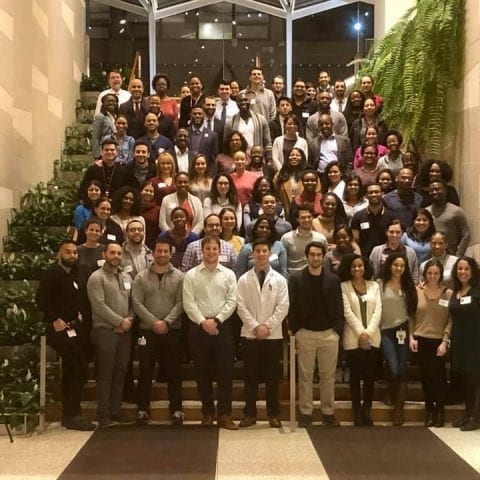Diversity Mentoring Cascade
The objectives of the Diversity Mentoring Cascade program is to:
- facilitate professional growth and development;
- leverage diversity and experiences in order to empower URM trainees to overcome barriers that hinder academic and professional success;
- create a supportive community for participants; and
facilitate growth in mentoring skills for all participants.
A Mentoring Cascade is a form of inter-generational learning in which knowledge, values, and practice cascade from one generation of health professionals to another. Mentoring Cascade teams are comprised of underrepresented minority faculty, medical school and residency alumni, fellows, residents and medical students, allowing for mentoring up and down the training “cascade.” There are about 10 teams made up of 4-7 medical students, 2-3 residents/fellows, and 2-3 faculty. The program meets five teams a year. Due to COVID-19, the program meets virtually. Participants are provided faculty biographies and team participant emails in order to connect virtually throughout the year.

Program Eligibility
Interested in joining? Trainees (Weill Cornell medical and PhD students, residents, and fellows) at WCM-NYP are invited to complete this application which is used to match participants to a team. Faculty at WCM-NYP are invited to complete this application. For more information or to join the next session, email dcoe-dmc@med.cornell.edu.
Program History
The Diversity Mentoring Cascade started on November 27, 2018 with a pre-planning session attended by medical students, residents, and faculty who provided feedback on what they wish they knew, what they need, and content that should be addressed in the program. The network grew from over 160 participants in its second year and over 200 in its third year. In 2020, Weill Cornell PhD students were invited to join the network.
Past speakers
How to be a mentee: Cultivating a Mentor-Mentee Relationship by Dr. Marcus Lambert with mentoring autobiographies by Drs. Kevin Holcomb and Susana Morales
Mentoring autobiography by Dr. Laura Riley
Mentoring autobiography by Dr. Lisa Newman
Mentoring autobiography by Dr. Joy Howell
Transitions to clerkships, residency, and fellowships with panelists Joy Howell, MD (Moderator), Angela Kadenhe-Chiweshe, MD, Tirsit Asfaw, MD, Thanakorn (TJ) Jirasivijinda, MD, resident Marvah Hill Pierre-Louis, MD, medical student Francesca A. Voza
Confronting bias in medicine
Personal Journeys: Dimensions of self and resilience
Participant feedback
This is an excellent program that provides much-needed support across the academic trajectory. Faculty 9/17/19
I enjoyed getting to know the medical students. It helps me remember why I went into medicine to begin with. So I enjoyed the introduction. Resident 9/17/19
Feel extremely comfortable speaking to my mentors and I felt reinspired about medicine and medical school! I am very pleased with the way it was organized. It gave me the chance to network and hear from all levels of training. Thank you so much for organizing this program! I am extremely grateful! Medical Student 1/29/19
References
Caruso TJ, Steinberg DH, Piro N, Walker K, Blankenburg R, Rassbach C, Marquez JL, Katznelson L and Dohn A. A strategic approach to implementation of medical mentorship programs. competing interests. Journal of Graduate Medical Education. 2016; 8(1): 68-73. doi.org/10.4300/JGME-D-15-00335.1
Cole DC, Johnson N, Mejia R, et al. Mentoring health researchers globally: Diverse experiences, challenges and responses. Global Pub Health. 2016;11(9):1093-1108.
Lewis V, Martina CA, McDermott MP, Trief PM, Goodman SR, Morse GD, LaGuardia JG, Sharp D, and Ryan RM. Randomized Controlled Trial of Mentoring Interventions for Underrepresented Minorities. Academic Medicine. 2016; 91(7): 994–1001. doi: 10.1097/ACM.0000000000001056
Orom H, Semalulu T, and Underwood W. The social and learning environments experienced by underrepresented minority medical students: A narrative review. Academic Medicine. 2013; 88(11) 1765–1777. doi: 10.1097/ACM.0b013e3182a7a3af
Tekian A, Jalovecky MJ, and Hruska L. The impact of mentoring and advising at-risk underrepresented minority students on medical school performance. Academic Medicine. 2001;76(12): 1264.
Updated: 6/22/21
